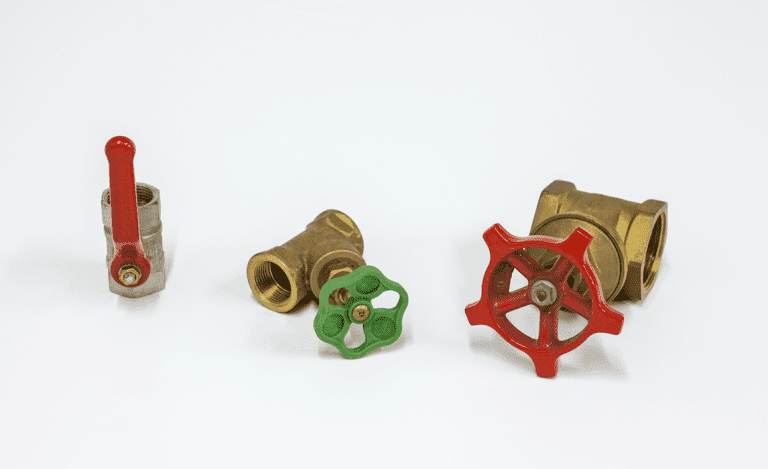Is Your Shut-Off Valve In Good Working Order?

As a homeowner, there are countless things to keep track of when it comes to maintaining your property. From the roof to the basement, every nook and cranny demands attention. However, there’s one crucial component often overlooked until it’s too late: the shut-off valve. This small device may seem unimportant, but it’s your first line of defense in a plumbing emergency.
When a pipe bursts or a major leak starts to cause excessive water loss and flooding, your shut-off valve needs to work correctly to prevent further damage. Our plumbers at Greenwell Plumbing, Heating & Air have put together this guide to ensure yours doesn’t fail you in your time of need.
What Is a Shut-Off Valve?
When most people hear the words shut-off valve, they think of the main one, which stops the water coming into your home. This is your go-to defense against pretty much any plumbing catastrophe and should always be kept in good working order.
Whether you have a leaking pipe, a broken shower knob, a busted water heater, or almost any other plumbing emergency you can think of, your shut-off valve is what will save you from endless water damage.
Besides the main shut-off, you also typically have shut-off valves at every toilet, faucet, and appliance in your home. These shut-off valves are perfect for any situation involving localized issues. If you have a leaking dishwasher, broken faucet knob, or a toilet that won’t stop running, for instance, the small shut-off valve will stop water flow to just that location while preserving water to the rest of the house.
Either way, any shut-off valve can mean the difference between a minor plumbing fix and major water damage, so it’s important to check them regularly to ensure they work properly.
Identifying & Locating Shut-Off Valves
The smaller shut-off valves are typically just a small metal handle you twist to close the valve and turn off the water flow. You can easily find an example of one next to your toilet.
On the other hand, the main shut-off valve is usually a ball valve, identifiable by a large lever or handle, often red in color, that runs perpendicular to the pipe when open. To close it, you’ll turn it a quarter turn until it goes the same direction as the pipe.
Some older homes have a gate valve with a small metal wheel, also usually red, that you turn to close the valve. If your home has a gate valve as the main shut-off, be careful, as these can break easily. It’s best to have it replaced with a modern ball valve as soon as possible.
Signs of Trouble With Your Shut-Off Valves
Like any other mechanical device, shut-off valves can wear out over time. It’s essential to look for signs of trouble and address any issues before you end up with a shut-off valve that doesn’t work in an emergency.
Some common indicators that your shut-off valve may need attention include:
- Difficulty turning: If your shut-off valve is stiff or difficult to turn, it may be corroded or jammed, making it ineffective in an emergency.
- Leaking: Any signs of water leakage around the valve indicate a potential problem. Even a small leak can escalate quickly, leading to water damage and increased utility bills.
- Rust or corrosion: Rust or corrosion on the valve or surrounding pipes can compromise its integrity, making it prone to failure.
- Age: Like most plumbing components, shut-off valves have a finite lifespan. If yours is several years old, even if it appears to function correctly, it may be time to consider replacing it.
What To Do With a Non-Working Valve
What should you do if your valve breaks? The answer depends on what the valve is doing. If it’s leaking, for instance, you could try grabbing a pair of pliers and tightening it up. If it’s stuck, you can try spraying it with WD-40 and letting it sit for a while before trying again, in the hopes that the oil will loosen up whatever is stuck.
If the valve is only partially closing, or if you can’t get it unstuck or it won’t stop leaking, you’ll need to call a plumber to determine whether the valve needs to be replaced. A shut-off valve that doesn’t close all the way can’t do its job in an emergency and is liable to leave you with a house full of water.
It can’t be stressed enough how important it is to check your shut-off valves occasionally. Finding out one isn’t working in a non-emergency situation is much less stressful and gives you time to get it fixed during normal business hours. Finding out it doesn’t work when you need it most will make a bigger problem out of something that could have been little more than an inconvenience.
Call Greenwell for Plumbing Repairs
If you’ve found a shut-off valve that isn’t working, call Greenwell Plumbing, Heating & Air to get it fixed. Our experienced plumbers can assess the valve and determine whether it needs to be replaced. We also understand that life happens, and you aren’t always going to catch a problem during business hours. We offer 24/7 emergency services when you need urgent plumbing help.
Contact the Greenwell team today to schedule shut-off valve repairs or other plumbing services in Louisville, KY or the surrounding areas of Southern Indiana.

